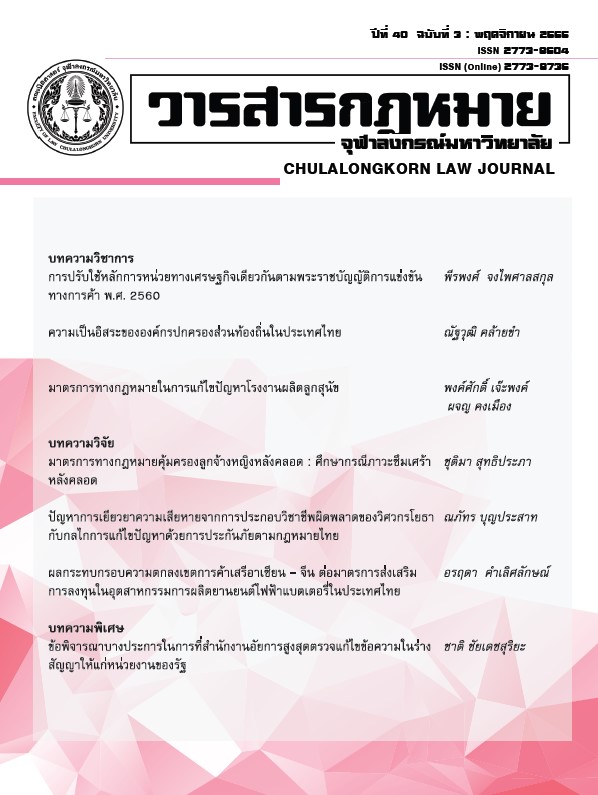Legal measures for protection of postpartum employee : A case study of postpartum depression
Main Article Content
Abstract
The period from pregnancy to childbirth is the huge transitional period, especially during postnatal period employees who having mother role have to face the changes in their physical conditions, social pressure, the close people and many responsibilities at work which lead to psychological and emotional impact of maternal employees. Most problem is postpartum depression. The study found that the Labor Protection Act of Thailand still has a loophole. Firstly, the maternity leave is too strict. Secondly, the compensation during maternity leave is provided by limit of period of payout. And the lastly, the breastfeeding period during the day, which has never seen before as a legal provision. According to problem findings and comparative the study with comparing with international law and the relevant law in Slovakia, Germany and United States of California. Therefore, this study proposes guidelines for improvement and amendment law, the Labor Protection Act of Thailand, to provide the rights and protection for maternal employees comprehensive and clearer.
Article Details

This work is licensed under a Creative Commons Attribution-NonCommercial-NoDerivatives 4.0 International License.
The copyright in this website and the material on this website (including without limitation the text, computer code, artwork, photographs, images, music, audio material, video material and audio-visual material on this website) is owned by Chulalongkorn University Law Journal and its licensors.
1. Chulalongkorn University Law Journal grants to you a worldwide non-exclusive royalty-free revocable license to:
- view this website and the material on this website on a computer or mobile device via a web browser;
- copy and store this website and the material on this website in your web browser cache memory; and
- print pages from this website for your use.
- All articles published by Chulalongkorn University Law Journal are licensed under the Creative Commons Attribution 4.0 International License. This permits anyone to copy, redistribute, remix, transmit and adapt the work provided the original work and source is appropriately cited.
2. Chulalongkorn University Law Journal does not grant you any other rights in relation to this website or the material on this website. In other words, all other rights are reserved. For the avoidance of doubt, you must not adapt, edit, change, transform, publish, republish, distribute, redistribute, broadcast, rebroadcast or show or play in public this website or the material on this website (in any form or media) without appropriately and conspicuously citing the original work and source or Chulalongkorn University Law Journal prior written permission.
3. You may request permission to use the copyright materials on this website by writing to journal@law.chula.ac.th.
4. Chulalongkorn University Law Journal takes the protection of its copyright very seriously. If Chulalongkorn University Law Journal discovers that you have used its copyright materials in contravention of the license above, Chulalongkorn University Law Journal may bring legal proceedings against you seeking monetary damages and an injunction to stop you using those materials. You could also be ordered to pay legal costs.
If you become aware of any use of Chulalongkorn University Law Journal's copyright materials that contravenes or may contravene the license above or any material on the website that you believe infringes your or any other person's copyright, please report this by email to journal@law.chula.ac.th.


